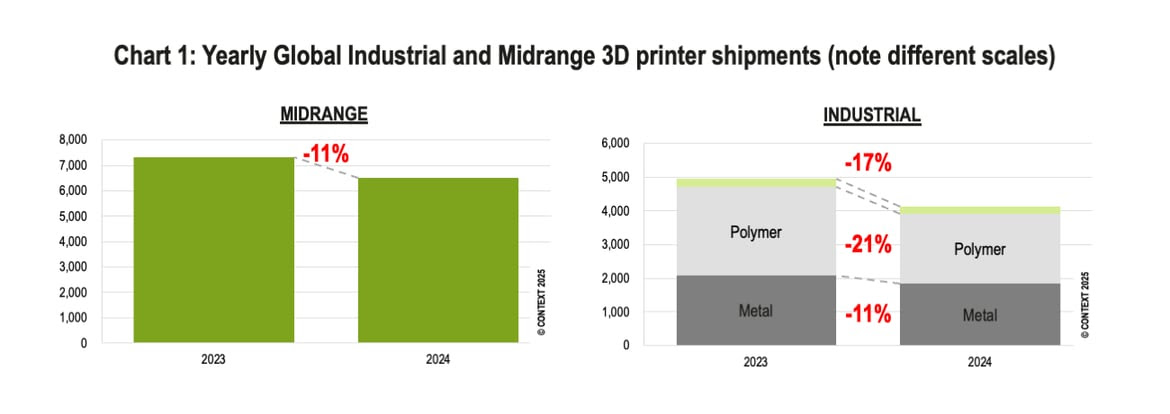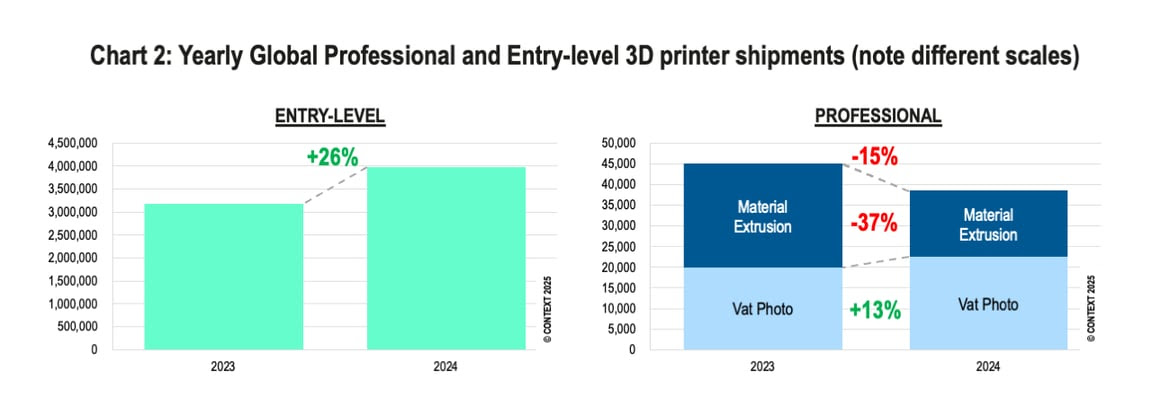London, 16 April 2025 – At the start of 2025, vendors
were optimistic and anticipated a rebound in Industrial 3D printing
sales within the year. However, high inflation, high interest rates,
layoffs, uncertain Mergers & Acquisitions (M&A) activity,
tariff disputes and increasing concerns about looming recessions
dampened this outlook.
Results from the fourth quarter of 2024 revealed
a downturn across all 3D printer sectors: sales of Industrial
($100,000+) printers declined by –6%, those of Midrange printers
(costing $20,000–$100,000) fell by –18%, and shipments of Professional
($2,500–$20,000) printers decreased by –11%. Even the previously
surging Entry–level segment experienced a –10% drop in global
shipments compared to the same period the previous year.
The year as a whole was challenging. Only the
Entry–level segment grew: shipments of printers priced below $2,500
were 26% up on 2023, driven by the emergence of brands like Bambu Lab
and the continued strength of market leader Creality. Although such
printers are primarily aimed at hobbyists, they have had an impact on
sales of Professional printers, which were –15% down on the previous
year (with some nuances). In 2024, global Midrange printer shipments
decreased by –11%, and sales of systems in the crucial Industrial
price class were –17% down on 2023.
2024 was a tough year across the globe for many
3D printer system vendors, marked by macroeconomic pressures and a
shifting competitive landscape. But beneath the surface, there’s a
clear sense of continued strong bottled–up demand that could reshape
the industry in 2025 and beyond.

Industrial systems
Industrial 3D printers underperformed woefully
against expectations in the quarter, with –6% fewer systems shipped in
Q4 2024 than in Q4 2023. While Industrial polymer printers bounced
back a bit, sales of Industrial metal printers were notably weaker
especially in China. Over the full year, global shipments of
Industrial additive manufacturing printer systems were down –17%: –21%
for polymer systems but only –11% for metals systems.
Industrial polymer systems
Global shipments of Industrial polymer systems
were up 10% in quarter (Q4 2024) thanks mainly to 23% YoY growth for
vat photopolymerisation systems. Demand in China bounced back:
shipments into the region were 53% higher than in Q4 2023, with most
of those coming from UnionTech. China was, once again, the top end
market and accounted for 34% of total global shipments. In the
second–largest region, North America (representing 29% of the
worldwide total), unit shipments dropped –14% YoY.
While the near–term period saw some marginal
growth not only in vat photo shipments, but also in polymer PBF
shipments (mostly from HP) and some in material jetting solutions
(mostly from Stratasys) the full–year was overall a quite difficult
year for Industrial polymer machine vendors as –21% fewer systems
were shipped worldwide in 2024 than in 2023. Shipments for all
categories of Industrial Polymer machines were down for the year:
vat photo –30%, PBF –6%, material extrusion –16% and material
jetting –10%.
Industrial metal systems
PBF systems accounted for 71% of all Industrial
metal printers shipped in Q4 2024 but unit shipments slid down –20%
YoY. Directed energy deposition (DED) saw its share increase to 17%
with a 15% rise in unit shipments – mostly thanks to the low–price
leader Meltio – but there was a YoY decline in shipments of systems
based on other technologies. After a very difficult third quarter,
China’s BLT regained its position as the top global vendor of metal
PBF printers (as measured by unit volumes) in Q4 2024, in spite of a
shipment drop of –11% YoY. In fact, all of the Top 5 vendors in this
sector were Chinese. Although the first half of 2024 was strong for
these companies, H2 2024 was more challenging and Q4 2024 was equally
weak for Western and Chinese manufacturers alike with unit shipments
of metal PBF systems down –22% and –20%, respectively.
From a revenue standpoint, the metal PBF sector
held up much better in Q4 2024, seeing only a –10% YoY decline. In
this regard, Western vendors fared better: EOS saw strong results and
Nikon SLM Solutions moved back into the global top spot as the company
with the highest revenues from Industrial metal PBF systems.
For the full year, the only sector in this
category seeing any shipment growth was DED (up 7% YoY): PBF
shipments were down –12%, those of material extrusion systems down
–29%, material jetting –18% and even metal binder jetting system
shipments were down –17% on the previous year. The only vendors
shipping more Industrial metal printers in 2024 than in 2023 were
Meltio, ZRapid Tech, Eplus3D and (marginally) TRUMPF. Overall system
revenues were down –11% but, thanks to rising demand for large
multi–laser systems, there was strong revenue growth for Nikon SLM
Solutions (29%) and Eplus3D (40%).
Midrange systems
Midrange printer shipments dropped –18% YoY in
total during Q4 2024. This was in spite of a 25% increase in sales of
material jetting systems that put this process ahead of all others.
While a few companies, including Stratasys, saw a YoY rise in
shipments of this type of machine, it was the 100% YoY growth of
Flashforge that catapulted the technology to the top spot. While
vendors like Stratasys attributed their growth to polymer systems and
strength in the dental market (particularly as the adoption of digital
dentures accelerates), Flashforge’s strength is in a wax–based
material jetting solution aimed primarily at the jewellery market.
Full–year shipments in this category dropped –11%
as eight of the Top 10 vendors shipped fewer printers in 2024 than in
2023. This was due mostly to declining sales in the category from
Western industry stalwarts Stratasys, 3D Systems, Formlabs and
Markforged, and because high–profile players like Nexa3D left the
market. Chinese companies, which mostly fulfil domestic demand, fared
much better with Flashforge and ZRapid Tech seeing full–year shipment
growth of +123% and +11%, respectively. Shipments to China grew by 5%,
enabling the country to edge out North America (where annual shipments
fell by –22%) to become the top region for Midrange printers in 2024.

Professional systems
The two sub–technologies in this price–class –
material extrusion and vat photopolymerisation – went in opposite
directions in 2024. In the fourth quarter, overall shipments in this
segment were down –11% on Q4 2023 but shipments of material extrusion
printers (generally FDM/FFF) were down –40% while those of vat photo
printers were up 18%.
Full–year shipments of Professional material extrusion printers
were down –37% YoY. Vendors of these machines, led by Raise3D and
UltiMaker, continued to lose ground to Entry–level price class
upstarts such as Bambu Lab.
While the material extrusion portion of this
category struggled again in 2024, vendors leveraging vat photo
technologies conversely reinvented themselves in 2024, resulting in a
reinvigoration of the sub–category. Leading OEMs shifted attention
away from laser and DLP–based solutions and towards masked
stereolithography, offering products leveraging new versions of this
process at similar prices to those using legacy technologies. Formlabs
and dental–centric SprintRay, industry leaders in this sector, saw
significant YoY shipment growth in Q4 2024 and helped push the market
split to 67/33 in favour of vat photo printers from the 50/50 share
with material extrusion printers just a year ago. These two companies
also led the way over the year as a whole: Formlabs shipped 29% more
machines in 2024 than in 2023, contributing to a 13% YoY rise in
global vat photo printer shipments.
Entry–level systems
Demand for Entry–level printers overall increased
significantly in 2024 and shipments for the full year rose 26% over
2023. However, all of the growth came in the first half of the year.
New vendors like Bambu Lab really struck a chord – not only with
consumers, but also with business users who shifted down from higher
priced products (especially the material extrusion printers that were
formerly the mainstay of the Professional price class).
Sales began to slow in this hot segment in Q3
2024 and growth turned negative in Q4 2024 when shipments fell just
shy of a million units for the quarter and –10% fewer printers
shipped globally compared to Q4 2023. Creality remained the
market–share leader (with a 40% share) but saw unit shipments drop
–25% YoY. Conversely, even while struggling with some negative press
toward the end of the year, the number two player (with a 20% share)
Bambu Lab saw their quarterly shipments rise 76%. Another bright
spot in this segment was growth for long–term player Flashforge
which saw shipments rise 77% as it continued to transform itself yet again.
Of all Entry–level 3D printers sold in the world,
in 2024, 96% came from Chinese vendors. A few minor players had
shifted some production to the US (the largest end–market for this
price–class), in anticipation of tariffs, but the economics of
producing such low–priced products in places where wages tend to be
much higher made such wholesale shifts in production not–yet–tenable
in 2024.
Outlook
Across the globe, big and small companies alike
have already hit all–important milestones this year: EOS shipped its
5,000th printer, Eplus3D its 100th “super–meter” metal PBF machine,
Xact Metal its 150th machine and Nikon SLM Solutions has produced its
1,000th metal PBF machine (and 50 of those are NXG large format
multi–laser systems!). The start of 2025 also saw new equity
investments including $120M for Stratasys, new investment for Velo3D,
the acquisition of Desktop Metal by Nano Dimension (which also has the
acquisition of Markforged on the horizon). The hope is that these
activities will bring new stability and profitability to the market as
it waits for the strong, pent-up demand reported by manufacturers of
Industrial AM systems to be let loose. The industry is no stranger to
such surges, having seen YoY shipments of Industrial systems jump 30%
YoY in 2021 after Covid lockdowns across the globe were lifted.
At the high end of the market, there is
anticipation of new demand developing due to global onshoring
initiatives, and that capital equipment expenditures will accelerate
again when interest rates drop. The timing of such interest rate drops
is the great unknown, and the situation is further complicated by
sticky inflation, tariff wars and M&A questions, especially in the US.
With major headwinds like these across the entire
AM market – and coming off a challenging Q4 2024 – CONTEXT notes that
forecasts have largely been shift–out with expectation now for flat to
single–digit unit shipment growth in 2025, mid–double–digit growth in
2026 and accelerating beyond that. Even with expectations for 2025
revised down, some pockets of excitement are anticipated in the year
ahead. M&A will again dominate the headlines but, more
importantly, there are glimpses of new models on the horizon which
could be of interest to 3D printing industry players and mainstream
audiences alike. For instance, we may see a low–priced (~$3,100)
full–colour material jetting printer come to market. Such a machine
has the potential to disrupt many different price classes, including
the Professional and the Midrange, and usher in a new age of innovation.